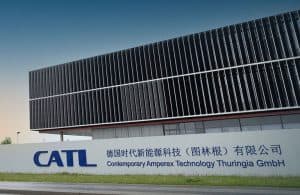
Contemporary Amperex Technology Co. Limited (CATL), the world’s largest electric vehicle battery manufacturer, announced that its new lithium-ion battery cell plant in Germany started series production “as scheduled”.
The Contemporary Amperex Technology Thuringia GmbH (CATT) in Thuringia is the company’s first factory outside of China. It was announced in 2018 as part of a business deal with BMW Group.
Construction of the site started in 2019. In Q3 2021, the G1 facility began production of battery modules (one module might consist of multiple cells), while the new G2 battery cell facility received approval in April 2022 and this month it came online.
The initial manufacturing capacity is estimated at 8 Gigawatt hour per year, although in the future, it’s expected to reach 14 GWh per year. According to CATL, at a total investment of up to $1.9 billion (€1.8 billion) up to 2,000 new jobs will be created in Germany.
Matthias Zentgraf, CATL’s president for Europe said:
“The production kickoff proves that we kept our promise to our customers as a reliable partner of the industry and we stay committed to Europe’s e-mobility transition even under very challenging conditions like the pandemic. We are working hard to ramp up production to full capacity, which is our top priority for the coming year.”
The company does not elaborate on the cell form factor or battery chemistry, but we guess that it’s the prismatic form factor.
CATL is currently investing an even higher amount – $7.8 billion (€1.8 billion) – in a much larger battery plant project in Hungary, which is set for 100 GWh of batteries annually. This new factory will produce battery cells for various plug-in car manufacturers, including the all-new cylindrical battery cells for BMW Group.
Globally, CATL is the largest battery supplier for electric cars with a 33% market share as of the first half of 2022 and an average output of well over 10 GWh per month. The company produces LFP-, NCM- and other battery chemistries, as well as battery system solutions, including cell-to-pack systems, which eliminates the necessity of modules inside the battery pack enclosure.
Currently, the company is considering whether one of its new plants will be built in North America.
